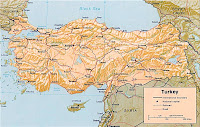Lots of news the past week about Ireland's government losing the confidence of the world credit markets (thus the imposition of austerity measures in order to get a large bailout from the IMF). Ross Douthat had a great piece about the huge number of McMansions in the Irish countryside, emblematic of the country's housing boom.
I learned from Meyerson's article that the Germans are still making things, and then they areexporting those things to other countries (their trade balance is second in the world, after China's). He states that manufacturing still accounts for 25% of Germany's economy, versus only 11% of the USA's economy.
Meyerson focuses on "mittelstands" which are family-owned (and not publicly-traded) manufacturing businesses. Because they are not driven by the desire to maximize share prices in the short term, mittelstands can works towards long-terms economic goals.
The article is well-structured because Meyerson provides the example of a mittlestand in Saxony-Anhalt that produces "axle-box housings for Chinese and German high-speed trains, machine tools requiring climate-controlled precision measurement." Since trains are the finished product, this is also an example of a manufactured product that is contributing to a (relatively, in any event) clean technology: mass-transportation.
Here's an excerpt summarizing the argument:
The mittelstand remains blissfully immune to many pressures that share-price-oriented financial markets inflict on their American counterparts. "We don't have short-term strategies, only long-term strategies," says Hubner. Mittelstand companies are not publicly traded, and they benefit from an extensive system of vocational education and a sector of municipally owned savings banks that work solely with local businesses. Roughly two-thirds of German small and mid-size businesses get their loans from these banks. "Over the past decade, banking largely became a self-fulfilling activity," says Patrick Steinpass, chief economist for the national organization of savings banks. "But our banks are restricted to doing business in their regions; they have to concentrate on the real economy." Through such radical notions has Germany thrived.





















